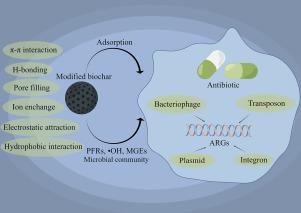Journal of Water Process Engineering ( IF 6.3 ) Pub Date : 2023-09-01 , DOI: 10.1016/j.jwpe.2023.104222 Yucheng Zhou , Siew Yoong Leong , Qunliang Li

|
Antibiotics and antibiotic resistance genes (ARGs) have become a severe environmental issue due to their widespread use in medicine and animal agriculture. Biochar is one of the efficient ways to combat pollution since it acts as a green adsorbent. However, the original biochar's adsorption capability needs to be improved to remedy the existing water pollution problem, and the difficulties of recycling it will lead to secondary contamination and drive up the cost of the solution. This means the original biochar must be altered to increase its adsorption capacity. This study provides a concise overview of the process of bacterial resistance and its transmission route from the perspective of environmental risk. Then it introduces the current mainstream modification methods. This study evaluated the pre- and post-modification biochar adsorption effects on several antibiotics and ARGs and the adsorption process and influencing factors. In conclusion, the benefits and drawbacks of employing modified biochar to control antibiotics and ARGs in water were proposed. Potential future uses for modified biochar are vast. This review article was written to serve as a resource for those interested in using modified biochar to remove antibiotics and ARGs.
中文翻译:

用于去除水环境中抗生素和抗生素抗性基因的改性生物炭:综述
抗生素和抗生素抗性基因(ARG)由于在医学和畜牧业中的广泛使用而成为严重的环境问题。生物炭是对抗污染的有效方法之一,因为它充当绿色吸附剂。然而,现有的水污染问题需要提高原始生物炭的吸附能力,且回收困难,会导致二次污染并提高解决方案的成本。这意味着必须改变原始生物炭以增加其吸附能力。本研究从环境风险的角度简要概述了细菌耐药性的过程及其传播途径。然后介绍了目前主流的改装方法。本研究评价了生物炭修饰前后对多种抗生素和ARGs的吸附效果以及吸附过程和影响因素。总之,提出了使用改性生物炭来控制水中抗生素和 ARG 的优点和缺点。改性生物炭未来的潜在用途是巨大的。撰写这篇综述文章的目的是为那些对使用改性生物炭去除抗生素和 ARG 感兴趣的人提供资源。































 京公网安备 11010802027423号
京公网安备 11010802027423号